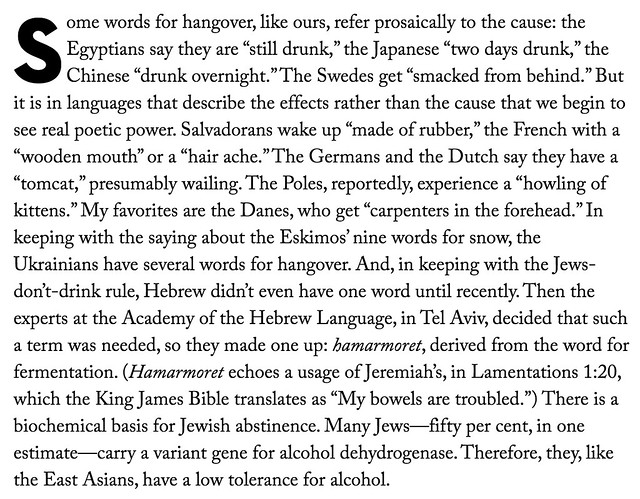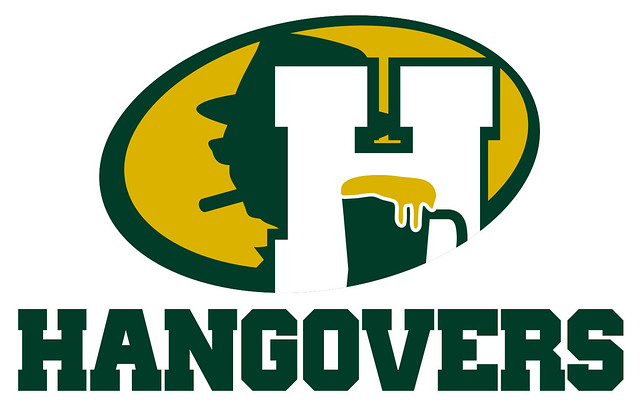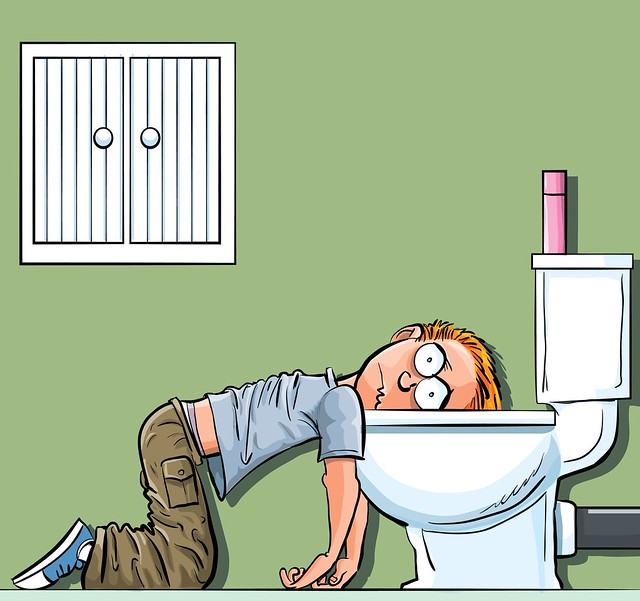
While searching for something this weekend, I happened upon A Few Too Many, by Joan Acocella, that appeared in The New Yorker magazine in May of 2008. If you’re a regular reader, you know I’m a word nerd, and love language. So her piece on hangovers included this gem of a paragraph, explaining how other languages described a hangover:

There’s some awesome phrases there, it may be time to create a page of hangover words, similar to Drunk Words, Puke Words and Beer Slang, or even my list of Beer In Other Languages.
Believe it or not, apparently the word “hangover,” meaning “a severe headache or other after effects caused by drinking an excess of alcohol,” was first used around 1902 or 1904 (depending on the source). It seems like it would be older than that, but apparently that’s when it was first seen in print in the United States, where the word originated. It did show up a little earlier, in 1894, as hang-over, but meaning “a survival, a thing left over from before.” Prior to hangover’s debut as the perfect word to describe our pain and discomfort, these were some of the most common words people used to describe that feeling.
- black dog
- blue-devils
- bottle ache
- bust-head
- carpenters in the forehead
- cropsick
- gallon-distemper
- hair-ache
- jim-jams
- katzenjammer
- morning fog
- wooden mouth
- the zings
Here’s “hangover” in several languages, with the literal translation in brackets, if known. My favorite is undoubtedly the Finnish word, which is “krapula,” which sounds exactly like you feel when you’re hungover.
- Afrikaans: babelaas or babbelas
- Albanian: gjellë e mbetur
- Amharic: ጥላቻ or t’ilacha
- Arabic: دوار من اثر الخمرة or dawwar min ‘athar alkhmr
- Armenian: կախաղան or kakhaghan
- Azerbaijani: asılılıq
- Basque: ajea
- Belarusian: пахмелле or pachmiellie
- Bengali: пахмелле or pachmiellie
- Bosnian: mamurluk
- Bulgarian: махмурлук or makhmurluk
- Catalan: ressaca
- Chichewa: chipewa
- Chinese (Mandarin): suzui [stay-over drunk]
- Chinese (Simplified): 宿醉 or Sù zuì
- Chinese (Traditional): 宿醉 or Sù zuì
- Colombian Spanish: guayabo [guava trees]
- Corsican: ressore
- Croatian: mamurluk
- Czech: kocovina
- Danish: tømmermænd
- Dutch: kater
- Esperanto: pendeto
- Estonian: pohmelus
- Finnish: krapula
- French: gueule de bois [a wooden gob]
- Georgian: ნაბახუსევი or nabakhusevi
- German: Kater
- Greek: πονοκέφαλο or ponokéfalo
- Gujarati: હેંગઓવર or Hēṅga’ōvara
- Haitian Creole: angove
- Hawaiian: ke kūkākūkā
- Hebrew: הנגאובר [severe dizziness]
- Hindi: अत्यधिक नशा or atyadhik nasha
- Hungarian: másnaposság [next-day-ish-ness]
- Icelandic: thynnka [thinness]
- Igbo: nkwụsị
- Indonesian: mabuk
- Irish: croí
- Italian: postumi della sbornia
- Japanese: futsukayoi [two-day drunk]
- Javanese: seneng banget
- Kannada: ಹ್ಯಾಂಗೊವರ್ or Hyāṅgovar
- Kazakh: асып кету or asıp ketw
- Khmer: ខកចិត្ត or khakchet
- Korean: 숙취 or suk-chwi or sugchwi [stay-over drunk]
- Kurdish: derxistin
- Kyrgyz: жазуу or jazuu
- Latvian: paģiras
- Lithuanian: pagirios
- Luxembourgish: zouhängt
- Luxembourgish: zouhängt
- Macedonian: мамурлак or mamurlak
- Malay: mabuk
- Malayalam: ഹാംഗോവർ or hāṅgēāvar
- Maori: tauranga
- Marathi: हँगओव्हर or Ham̐ga’ōvhara
- Myabmar (Burmese): ရက်နာ or raat nar
- Norwegian: bakrus
- Persian: خماری
- Polish: kac
- Portugese: ressaca
- Punjabi: ਹੈਂਗਓਵਰ or Haiṅga’ōvara
- Romanian: Mahmureală
- Russian: poxmel’je [from drink]
- Samoan: tautau
- Scots Gaelic: air an fhiodh
- Serbian: мамурлук [crapulence]
- Sindhi: هوريور
- Sinhala: අම්මගෙන්
- Slovak: kocovina
- Slovenia: mamica
- Somali: hareeraha
- Spanish: resaca [undertow or backwash]
- Swedish: kopparslagare [coppersmith]
- Tajik: бармегардад or ʙarmegardad
- Tamil: நீட்டிப்புப் or Nīṭṭippup
- Telugu: హ్యాంగోవర్ or Hyāṅgōvar
- Thai: อาการเมาค้าง or Xākār meā kĥāng
- Turkish: aksamdan kalmalık [evening remainder]
- Ukranian: похмілля or pokhmillya
- Urdu: پھانسی
- Uzbek: kaltaklash
- Vietnamese: nôn nao or dựng xiên [built cockeyed]
- Welsh: hwyr
- Xhosa: isango
- Yiddish: כאַנגאָוווער or khangovuer
- Yoruba: idokunrin

And here’s a few random slang words for hangovers:
- American slang, early 1900s: crapulous
- American slang: PRS, for “Post Refreshment Syndrome”
- Central American slang: “goma” which is rubber
- Danish slang: tømmermænd, which apparently means “carpenters”
- French, antiquated: mal aux cheveux, which essentially meant a “hair-ache”
- German slang: kater, which means “tomcat,” and people hungover are also said to be “verkatert,” or “catted.” It’s supposedly derived from the word “katarrh,” an antiquated expression for an illness.
- Italian slang: postumi della sbornia, which means the “after-death of the drunkenness”
- Mexican slang: crudo, which means “raw”
- Modern Irish: Ta dha cinn orm, which apparently means “There are two heads on me”
- Polish slang: kac
- Swedish slang: baksmälla, which roughly means “a whack on the ass”
And finally, here’s a list I found of “distinctly Irish ways to describe your hangover:”
- I’m in Lego
- The horrors
- I feel like boiled shite
- Sick as a small hospital
- I’m puking my ring
- Bottle of ghosts
- I’ve had a bad pint
- Brown bottle flu
- I’m in a heap
- Mouth like a fur boot
- I’ve got The Fear
- In rag order


In Latin: Caput Ligneum (wooden head). Source: Asterix.
In Dutch sometimes referred to as “pijn in de haarwortels” – “pain in the hair follicles”
I don’t trust Astérix as an authority on Latin usage; caput ligneum is an obvious calque of French gueule de bois. (gueule is most literally ‘mouth’ of an animal, but is also used to mean ‘face’ or ‘head’.)